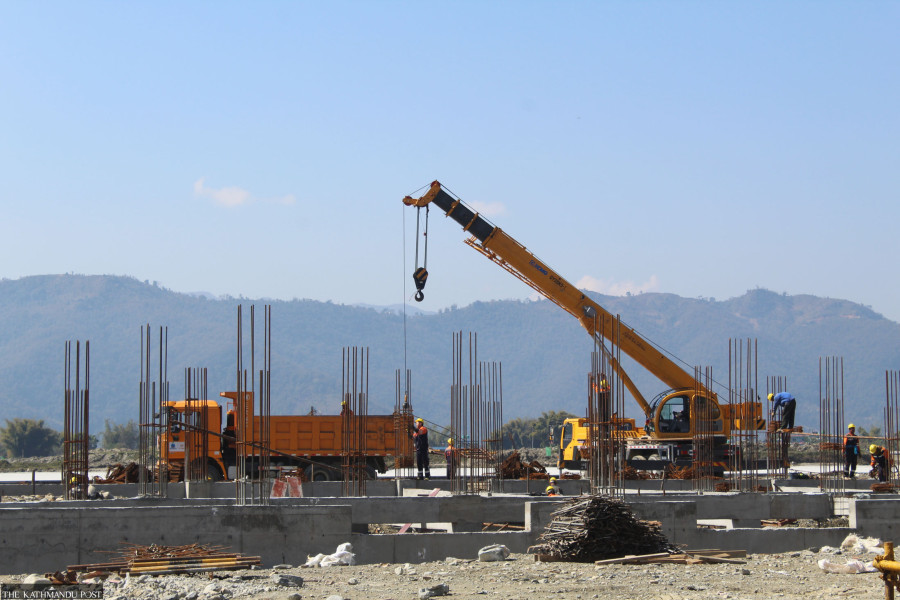Money
IMF says Nepal’s economy will grow 3.5 percent this fiscal year
An IMF team led by Tidiane Kinda visited Kathmandu from September 21 to October 5.
Post Report
The International Monetary Fund (IMF) has forecast Nepal’s economy to grow 3.5 percent in the current fiscal year, way below the growth projected by the Asian Development Bank and the World Bank.
While Nepal has targeted to achieve 6 percent annual economic growth, the Asian Development in its September 20 report has projected Nepal to grow 4.3 percent. This week, the World Bank projected Nepal’s economy to grow by 3.9 percent.
The IMF said Nepal’s growth is below potential due to weak domestic demand.
Tidiane Kinda, senior economist at the IMF, said in a statement that necessary balance sheet repairs after the credit boom and the sluggishness in the real estate market have been limiting credit growth in spite of monetary relaxation.
The IMF said that Nepal’s inflation remained high at 7.5 percent in August but is expected to recede. “Nepal’s medium-term outlook remains favourable as strategic investments in infrastructure, especially in the energy sector, are expected to support potential growth.”
The IMF said that Nepal’s external position has strengthened, supported by prudent fiscal and monetary policies, buoyant remittances, and a post-pandemic rebound in tourism, despite spikes in regional food prices.
However, on the domestic front, growth is estimated to have slowed in the last fiscal year, reflecting last year’s import restrictions and regulatory uncertainty on land markets and construction licencing, lower credit flows, and weaker domestic demand in the context of large post-Covid emigration outflows.
The ensuing shortfall in revenue pushed the fiscal deficit upward in the last fiscal year, but to a level that remains consistent with a sustainable level of public debt, reflecting budget discipline.
An IMF team led by Kinda visited Kathmandu from September 21 to October 5 to hold discussions on the policies and reforms that could lead to the completion of the 3rd review of the authorities’ economic programme supported by the IMF’s Extended Credit Facility (ECF).
The Nepali authorities and IMF staff reached a staff-level agreement on the policies and reforms needed to complete the 3rd review under the ECF.
The agreement is subject to approval by the IMF’s Executive Board. Completion would make available $51.3 million, bringing total disbursements under the ECF thus far to $205.4 million, from a total of $369.8 million, the IMF said.
“Nepal continues to make progress with the implementation of the ECF-supported programme. On the fiscal front, important achievements by the Ministry of Finance include the formulation of a fiscal risk register, the publication of non-custom tax exemptions, and the implementation of a cash flow forecasting framework, all reforms aimed at strengthening the transparency of public finances and further enhancing fiscal management,” the IMF said.
Regarding monetary and financial sector matters, major achievements by Nepal Rastra Bank include the full implementation of the supervisory information system for Class A, B and C banks (excluding the onsite module) and the issuance of a new set of bank asset classification regulations, which appropriately aimed at strengthening monitoring capability and improving bank asset quality.
“Against this background, the policies and reforms envisaged in the ECF remain well-placed to facilitate the needed transition to more stable, pro-growth credit while ensuring macroeconomic and financial stability,” said Kinda in the statement.
On reforms, the Nepali authorities and IMF staff agreed on giving priority to the formulation of a domestic revenue mobilisation strategy to improve tax collection, developing an action plan to improve the efficiency of public investment spending, launching a loan portfolio review of the banking system, continuing to strengthen the central bank’s supervisory information system onsite module, and amending the Nepal Rastra Bank Act.
The IMF said that Nepal is committed to strengthening its anti-money laundering and countering the financing of terrorism supported by the IMF technical assistance.




 9.83°C Kathmandu
9.83°C Kathmandu














